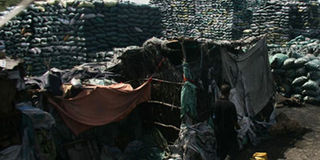Shabaab still benefitting from Kismayu charcoal exports – UN

Traders sell charcoal in Kismayu in May 2013. The Kenya Defence Forces has been accused of colluding with Al-Shabaab terrorists in Somalia’s illegal multi-billion-shilling charcoal trade. FILE
What you need to know:
- Shabaab makes as much as $56 million (Sh4.8 billion) a year by shipping charcoal from Kismayu and Baraawe, another port in southern Somalia, Unep estimates.
- The African Union Mission in Somalia is contesting Shabaab's control of Baraawe, while Kismayu has been occupied by Kenyan troops since October 2012.
- The UN Security Council banned charcoal exports from Somalia in February 2012.
- The amount of charcoal shipped from Kismayu and Baraawe has actually increased in the two-and-a-half years since the ban was imposed, Unep says.
Al-Shabaab is continuing to finance its operations through charcoal exports from the port of Kismayu, the United Nations Environmental Programme says in a new report.
Shabaab makes as much as $56 million (Sh4.8 billion) a year by shipping charcoal from Kismayu and Baraawe, another port in southern Somalia, Unep estimates.
The African Union Mission in Somalia is contesting Shabaab's control of Baraawe, while Kismayu has been occupied by Kenyan troops since October 2012.
Amisom says that 3664 Kenyan troops and 850 soldiers from Sierra Leone are currently stationed in and around Kismayu.
Kenyan forces in the Kismayu region are commanded by Brig Walter Koipaton Raria, Amisom says on its website.
CHARCOAL EXPORTS BAN
The UN Security Council banned charcoal exports from Somalia in February 2012. But the amount of charcoal shipped from Kismayu and Baraawe has actually increased in the two-and-a-half years since the ban was imposed, Unep says.
The Unep report, entitled “The Environmental Crime Crisis,” does not directly allege that elements of the Kenya Defence Force are colluding with Shabaab in illicit sales of charcoal via Kismayu.
But a UN monitoring group charged explicitly in July 2013 that the charcoal trade through Kismayu has been “divided into three between al-Shabaab, Ras Kamboni (a local militia group) and Somali Kenyan businessmen cooperating with the KDF."
The Kenyan military rejected the UN monitoring group's claim that the KDF is complicit in charcoal exports from Kismayu.
Earnings from the charcoal trade are vital in sustaining al-Shabaab's capacity to carry out attacks in Somalia and Kenya, Christian Hellemann, the principal analyst for the Unep report, said in an interview on Friday.
He likened charcoal smuggling from Somalia and other African countries to the drug wars in Mexico in terms of violence and amounts of money involved.
Illicit exports of charcoal from Somalia are worth as much as $384 million a year, the report says. Other groups in Somalia, in addition to Shabaab, profit significantly from the trade, Mr Hellemann said.
Shabaab earns up to $8 million a year by “taxing” charcoal traffic at a roadblock it maintains in Badhaadhe District in Lower Juba Region, the Unep report adds.
Charcoal in East Africa is as valuable an energy source as is oil in many parts of the world, Mr Hellemann noted.
The report he oversaw says “the domestic and transnational trade in charcoal from Madagascar, Mozambique, Tanzania, Uganda and Kenya is worth at least $1.7 billion annually.



